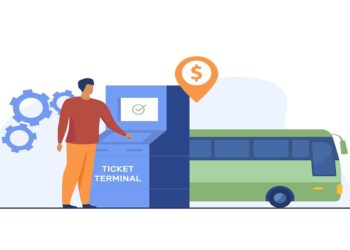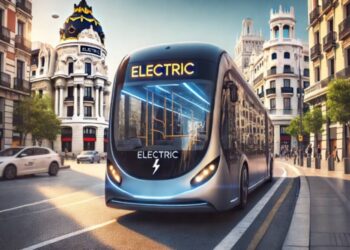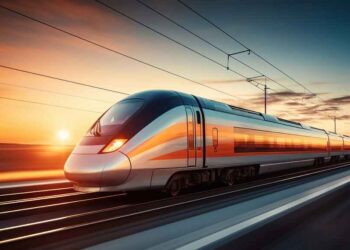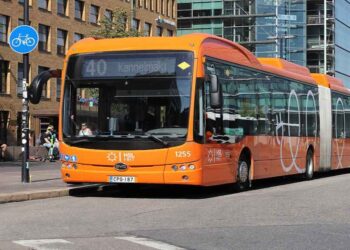GERMAN Rail has awarded Siemens Mobility a contract worth more than €2bn to deliver 90 new XXL 13-car S-Bahn trains for the Munich S-Bahn, with an option for additional trains, following a Europe-wide tender.
DB says the new S-Bahn trains will be the first in Germany to be fully accessible throughout. The trains will be 202m long and 3m wide, with seating for 480 passengers and total capacity for 1841 passengers. The first trains are scheduled to enter passenger service at the end of 2028.
The new fleet has been ordered as the state of Bavaria and Munich S-Bahn operator DB Regio prepare to meet the growth in passenger traffic forecast over the coming decades. DB Regio published a tender for up to 200 EMUs for the Munich S-Bahn, including an option for up to 90 more, in October 2020.
The interior LED lighting installed on the new trains will change in colour depending on the time of day. Standard three- and four-seat configurations will offer more legroom than the trains currently in service, and there will also be group areas and tip-up seats.
The trains will also feature free passenger Wi-Fi, improved mobile phone reception due to special window glass, USB and power sockets, and large luggage storage racks. A more powerful heating, ventilation and air-conditioning (HVAC) system using environmentally-friendly refrigerants will ensure interior temperatures remain comfortable even in extreme heat of up to 45oC.
The passenger information system will be completely new. The 104 internal displays above the doors and mounted on the ceiling will provide information on station stops and the occupancy of cars within the train. The 62 exterior displays above the doors will provide information about the S-Bahn line number, destination and intermediate stops. Before passengers leave the train, the interior displays will indicate where the closest stairs or lifts are located on the station platform. External LED strips will show the colour of the respective S-Bahn line that the train is operating on.
The 31 1.4m-wide doors and spacious vestibules will ensure quick boarding and alighting. Depending on the train’s occupancy, the tip-up seats can be automatically locked in the vertical position to provide additional standing room. Five of the 13 cars have large multi-purpose zones, accessed through three doors, that provide sufficient room for bicycles, pushchairs and larger items of luggage.
Special areas at each end of the train will provide space for passengers using wheelchairs, while passengers with hearing aids can connect to the passenger information system via Bluetooth to hear onboard announcements.
Siemens says the new trains will be more innovative, incorporate more digital technology, and will be networked to minimise lifecycle costs through maximum energy efficiency, lower maintenance costs, and optimised operational support. This includes the use of SiC semiconductors, a more efficient traction transformer that does not use oil as a coolant, and intelligent control software. Lightweight vehicle construction and a more aerodynamic design also reduces traction energy consumption.
The contract to supply the new fleet includes maintenance until 2034.
The S-Bahn trains are designed with a large number of redundant components and are equipped with Siemens’ Railigent X system to guarantee maximum train availability. Software updates will be transmitted to the trains via a secure online connection.
The trains will be equipped with ETCS, ATO , and a train integrity monitoring system (TIMS). DB plans to equip the Munich rail network with ETCS from 2030.
Public transport authority Bavarian Railway (BEG) unveiled a three-stage long-term plan for the 434km Munich S-Bahn network in February 2016. DB Regio subsidiary S-Bahn Munich was awarded an interim operating contract that ran from December 2017 until December 2019, when a new long-term contract covering the entire network came into effect.
Under the contract, the state of Bavaria receives the revenue from ticket sales and assumes revenue risk. S-Bahn Munich receives a fixed monthly payment from BEG that covers all operating costs.
Financing of the new S-Bahn trains was provided to DB by BEG, which selected LHI Leasing, based in Pullach near Munich, to lease the new fleet, funded by the European Investment Bank (EIB) and UniCredit Bank. The state of Bavaria made favourable financing conditions possible with a capital service guarantee.
“A 200m-long S-Bahn train means higher capacity, better punctuality, and greater comfort for our passengers,” says DB board member for regional transport, Ms Evelyn Palla. “Germany’s most modern S-Bahn trains will be an important component in our efforts to drive the mobility transition in the Munich region. Each of the new XXL trains will replace 1500 cars during the rush hour.”


































